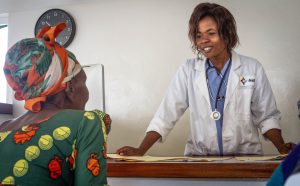summit
Changing Models for a Changing Landscape

As we all make our way through what has been an unprecedented year for so many around the world, I am struck by the way my experiences in philanthropy have shaped my understanding of the pandemic, clarified my sense of priorities, and inspired my sense of hope at the road ahead.
There has been a lot of talk in philanthropy this year about the importance of freeing up funds and supporting grantees with as few restrictions as possible, to allow for flexibility and vital support during these times of crisis. Leading foundations and philanthropists have stepped forward with larger and less restrictive gifts than ever before.
Our founding principle was a commitment to listen to our grantees and partners and to follow their lead. From the start, we have deferred to local experts to make a positive impact outside of our own culture and communities, where unrestricted support and Congolese-led solutions have always been the priority for the Eastern Congo Initiative (ECI).
My journey with ECI began on the shores of Lake Kivu, in the Democratic Republic of Congo. My good friend and co-founder Whitney Williams and I gathered in a clapboard legal clinic just outside of Goma and listened to a group of brave women share their stories of sexual violence. We sat in stunned silence as each woman shared the horrific details of her experiences. These women bore witness to the worst of what we as humans have to offer. And yet they also showed the very best of who we can be — their profound strength continues to fuel everything we do.
To better understand the strength, the ingenuity, and the beauty of Congo, we began by mapping the assets and opportunities that already existed within the east. We were determined to support the leaders and organizations already solving problems in the region.
We quickly realized that one of the most underutilized assets in eastern Congo was the recovering civil society, which, despite insecurity and war, was already serving their communities. So we started there. We doubled down on local resources. We funded AFEM, the first women-operated radio network in Congo, for those women to share their experiences across communities afflicted by the epidemic of rape. We contributed to Dr. Denis Mukwege’s Nobel Prize-winning work to support survivors of rape and injustice. We worked with organizations like Un Jour Nouveau to incubate small businesses. In total, we have supported over 40 local organizations to better serve their community, with over 60% of grants specifically crafted to impact women throughout a blended portfolio that realizes their vision for Congo.
In a world reshaped by compound crises of health and economy, we’ve reconsidered the way that ECI has worked. Today, we celebrate a year since the merger of our philanthropic work with the extended network and reach of a community-run business, Asili, serving as a platform for self-sufficient Congolese businesses.
ECI brings change via collaborative grantmaking, international advocacy, and policy leadership. Asili is operated by residents of the South Kivu region and runs a platform they designed with Alight (formerly the American Refugee Committee) and IDEO.org. Our merger creates the opportunity to expand and deepen our impact, and co-create solutions that integrate advocacy, market building, social enterprise, and grantmaking.
The ECI-Asili merger is grounded in a shared commitment to operating as a human-centered effort that both invests in the individuals doing the hard work of building their businesses and supporting their communities. Our new combined capacity is far beyond what either organization might have had alone and our new identity is a shift from traditionally more bifurcated philanthropic roles.
In the year since the international community began to recognize the full scope and impact this pandemic might have, the world has changed. We are now entering an era that will require more collaboration among philanthropies, businesses, and community-led organizations. The challenges we face are complex and multifaceted. Relief for communities hinges on the creativity and resourcefulness of those working toward solutions, and our chances of success are infinitely better if we are all working together.
